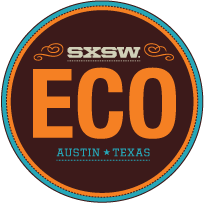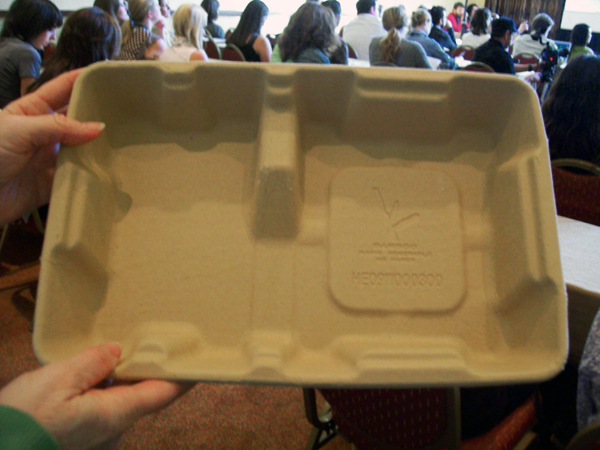1-800-RECYCLING.com staff writer Beth Buczynski is in Austin, TX, this week for the inaugural SxSW Eco conference, a three-day event celebrating all things sustainable and green. She is reporting her most interesting green finds here.
Yesterday, October 4, was the first day of SxSW Eco, a three-day conference dedicated to finding a concerted, cross-sector approach to solving recognized sustainability/environmental challenges.

A highlight from the first day’s sessions was a presentation by Oliver Campbell, Director of Procurement of Packaging and Packaging Engineering for Dell Inc.
Since Campbell’s session followed on the heels of a talk about sustainability in agriculture, he kicked off his presentation by telling the audience that he comes from a long line of farmers, and that his experience growing up in agriculture heavily influenced the way he approaches
packaging innovation at Dell.
Campbell stated that he had no experience with packaging design or sourcing when he arrived at Dell, and that this lack of experience was actually a blessing in disguise, because it eliminated traditional constraints about what packaging is and how it relates to our environmental impact on the earth.
Instead, Campbell borrowed ideas from his agricultural background to identify packaging materials that are sustainable and rapidly renewable, and materials that would help slow deforestation in relation to packaging creation.

This emphasis led Campbell and his team to look at ancient materials and agricultural wastes that could be reclaimed to create sustainable packaging. Dell wanted to think beyond the commonly used “post-consumer waste cardboard” and create something truly innovative.
And innovate they did.
Currently, Dell is using sustainably harvested,
fully recyclable bamboo to create packaging for a significant percentage of its laptops and notebooks (pictured above). Campbell also passed around a piece of “Styrofoam” made from mushrooms, another
biodegradable material being tested as packaging for highly sensitive technologies. Other materials currently in development include straw and chaff from wheat and cotton hulls.
The best thing about Dell’s sustainable packaging is that the company has considered the entire supply chain when choosing what to source and where to source it from. Not only are these new materials easy to dispose of in an environmentally responsible manner, but they are also sustainably procured in a way that respects native peoples and habitats.
Check back for more from SxSW Eco tomorrow on 1-800-RECYCLING.com!
 A highlight from the first day’s sessions was a presentation by Oliver Campbell, Director of Procurement of Packaging and Packaging Engineering for Dell Inc.
Since Campbell’s session followed on the heels of a talk about sustainability in agriculture, he kicked off his presentation by telling the audience that he comes from a long line of farmers, and that his experience growing up in agriculture heavily influenced the way he approaches packaging innovation at Dell.
Campbell stated that he had no experience with packaging design or sourcing when he arrived at Dell, and that this lack of experience was actually a blessing in disguise, because it eliminated traditional constraints about what packaging is and how it relates to our environmental impact on the earth.
Instead, Campbell borrowed ideas from his agricultural background to identify packaging materials that are sustainable and rapidly renewable, and materials that would help slow deforestation in relation to packaging creation.
A highlight from the first day’s sessions was a presentation by Oliver Campbell, Director of Procurement of Packaging and Packaging Engineering for Dell Inc.
Since Campbell’s session followed on the heels of a talk about sustainability in agriculture, he kicked off his presentation by telling the audience that he comes from a long line of farmers, and that his experience growing up in agriculture heavily influenced the way he approaches packaging innovation at Dell.
Campbell stated that he had no experience with packaging design or sourcing when he arrived at Dell, and that this lack of experience was actually a blessing in disguise, because it eliminated traditional constraints about what packaging is and how it relates to our environmental impact on the earth.
Instead, Campbell borrowed ideas from his agricultural background to identify packaging materials that are sustainable and rapidly renewable, and materials that would help slow deforestation in relation to packaging creation.
